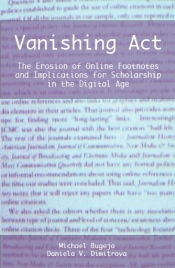Extinct Citations, Missing Links and Other Bibliographical Wonders

Chapter one of Vanishing Act: The Erosion of Online Footnotes and Implications for Scholarship in the Digital Age, by Michael Bugeja and Daniela V. Dimitrova, is now online:
Extinct Citations, Missing Links and Other Bibliographical Wonders
A decade ago, most research was done in the library rather than through its Web site, and scholars, editors, graduate directors and librarians were meticulous about the integrity of footnotes. They knew that citation was the backbone of research, from agronomy to zoology in the sciences and from art history to Zen studies in the humanities. The footnote upheld standards because it allowed others to test hypotheses or replicate experiments. Testing and replication are at the heart of the peer review and scientific processes upon which academe is based, from papers by first-year and transfer students to grants by postdoc and professor.
Because so much depended on the foundation of all scholarship, the footnote, academicians admonished students for sloppy or erroneous citation. This was the norm even a decade ago when most research was done in the library rather than through its Web site. Our discipline of communication scholarship was as exacting as any other in the academy, especially when it came to footnotes. Students submitting dissertations and faculty, journal articles, were fastidious about the accuracy of footnotes, knowing that their reputations relied on the fine print at the bottom of the page or at the end of the manuscript. Unacceptable were citations that simply named the source without specifying the document, as in “U.S. Mint, 801 9th Street NW, Washington, DC 20220-0001.” The worst types of mistakes would contain particulars, including an article’s title and date of publication, but might locate it in the wrong volume and issue of a journal. Indeed, if dissertation advisers went to the stacks to verify citations, as they often did, they would be aghast at checking a citation and finding none in any volume or number, or finding it with wrong pages or other particulars, and discovering a journal with those pages ripped out and missing. Those mistakes could doom a letter of recommendation for a job or advanced study. More…
2 comments on “Extinct Citations, Missing Links and Other Bibliographical Wonders”
As you may know, the ALA changed its web site, broke a huge number of links, and never added redirects. I wish it hadn’t done that. I simply cannot update all the links I made to the ALA. And why, if the ALA might again redesign its web site?
Dan – I agree with you. Of all professional organizations, I think ALA should be better regarding its documents.
Comments are closed.